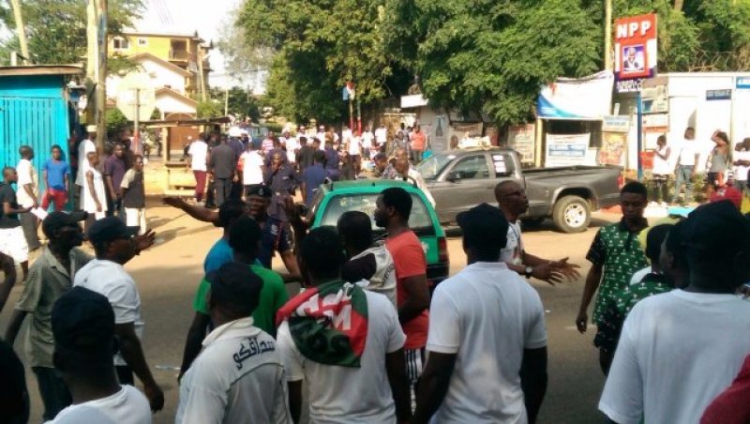High unemployment and breakdown in family ties are causes of election violence in the Bono and Ahafo Regions, a study has revealed.
The survey also identified weak or inadequate electoral management body structures, including weak democratic institutions, dysfunctional judicial systems and polarized security agencies as major threats to the nation’s multi-party democracy, freedom of speech and rule of law.
The study recommended the need for successive governments to address these critical national challenges to foster unity and social cohesion in the nation’s political space.
It was conducted by Global Media Foundation (GLOMeF), Tim Africa Aid Ghana, and West Africa AIDS Foundation, all NGOs as part of a-15 month Election 2020 project being implemented by the NGOs with support from Star Ghana Foundation.
The project aimed at discouraging and reducing election-related violence in the constituencies through community dialogue and conflict resolution.
It is also to increase women, young people as well as People with Disabilities (PWDs) participation in politics and governance.
It further aimed at increasing the capacities of the electorate and election stakeholders, mostly in hard to reach communities, to influence political party manifesto to promote issue-based electioneering.
Titled “managing election 2020 related violence for democratic stability in Ghana”, the study was conducted in the Asunafo North and Asunafo South constituencies of the Ahafo and Banda and Tain constituencies of the Bono Region.
Police in the two regions have identified these areas as volatile and major election hotspots constituencies with a long history of political violence that threaten national peace and stability.
Societal challenges such as inequality and poverty, ethnicity and gender inequality remained electoral challenges of greater concern, Mr Raphael Godlove Ahenu, the Chief Executive Officer of the GLOMeF who released the outcome of the study indicated.
Speaking at a day’s election reporting training workshop for journalists, held in Sunyani, Mr Ahenu explained the concept of the study was drawn from data collected from Ghana’s 2012 Round five Afro barometers and the pre-election survey conducted by the Center for Democratic Governance (CDD-Ghana).
The three NGOs, implementing the Star Ghana Foundation project, organised the training workshop, which was attended by about 30 selected Journalists from the project implementing regions.
Other electoral challenges the survey mentioned included selfish leadership and weakened civil society activities, Mr Ahenu indicated saying until these challenges were addressed, it would be difficult for the nation to control political and election violence in the country.
Latest Stories
-
Vasseur questions ‘strange momentum’ of Formula One race director change
14 mins -
“I am disappointed in Kojo Manuel” – Merqury Quaye on “no tie” comment
15 mins -
Nana Kwame Bediako; The beacon of unity
17 mins -
Western Region: NDC youth wing embarks on phase 2 of ‘retail campaign’
43 mins -
Action Chapel International holds annual Impact Convention in November
43 mins -
Jana Foundation urges young women to take up leadership roles
48 mins -
All set for Joy FM Prayer Summit for Peace 2024
59 mins -
Managing Prediabetes with the Help of a Dietitian
1 hour -
Joy FM listeners criticise Achiase Commanding Officer’s election comment
2 hours -
Legal Aid Commission employees threaten strike over poor working conditions
2 hours -
Ghana ranked 7th globally as biggest beneficiary of World Bank funding
2 hours -
IMF board to disburse $360m to Ghana in December after third review
2 hours -
Former Bono Regional NPP organiser donates 13 motorbikes to 12 constituencies
2 hours -
Securities industry: Assets under management estimated at GH¢81.7bn in quarter 3, 2024
2 hours -
Gold Fields Ghana Foundation challenges graduates to maximise benefits of community apprenticeship programme
4 hours

